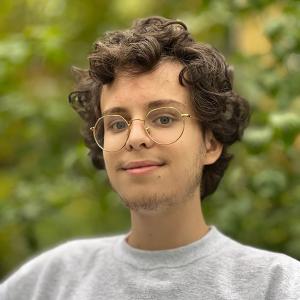One of the benefits of working at a college or university is having access to some of the best writers, scientists, academicians, researchers, musicians, artists, social reformers, environmentalists, and politicians of the day. Here at Oberlin, these talented folks come to campus through informal programming sponsored by the college, a student group, an endowment, a department or office, or a formal program such as the Convocation Series or the Artist Recital Series.
In my first year here, such notables as Michael Pollan, Newt Gingrich, bell hooks, eighth blackbird, Juilliard String Quartet, Frank Rich, Midori, Avery Brooks, and Johnnetta B. Cole came to Oberlin. This who's-who list does not include the academicians that various departments and offices invited to classrooms and lecture halls to speak or be part of a panel. Nor does it include professional musicians who came to the conservatory to give master classes in a variety of music genres or perform in one of the conservatory's intimate recital halls.
All this is great, right? And not unlike what happens at many other colleges and universities.
In fact at the university where I formerly worked, these kinds of programs often took place during the lunch hour or late afternoon. The idea, I believe, coz no one ever said, was to encourage the entire campus community to attend as well as those from the neighborhood or who worked downtown. It was particularly beneficial to staff, as we were able to arrange our workday around the often-scheduled 11:45 a.m. or 4 p.m. presentation. As a staff member, I appreciated this gesture and attended as many conferences, lectures, concerts, readings, panel discussions, and recitals of interest as I could. I went to hear Henry Louis Gates, Stephen Hawking, Rita Dove, Tracy Kidder, Hazel O'Leary, the Three Doctors...
It's a tad different at Oberlin. These kinds of programs take place but are often late in the afternoon or in the evening. As a commuter, I'm not able to attend most of these happenings. With a family to get home to for dinner, homework, among other things... staying after work is not usually an option. Whenever I get wind of a speaker coming to campus midday, though, I'm there. But that's generally the exception, not the rule.
As one who appreciates a good read and the hard work that goes into developing a story, I'm always on the lookout for programs involving writers. How I would have liked to have heard Pulitzer Prize-winning author Junot Dìaz, whose recent visit served a dual purpose: Latino/a Heritage Month, the Oberlin College Convocation Series.
Since I was unwilling to sacrifice an evening to hear his presentation, I decided the next best thing would be to read his award-winning book, The Brief Wondrous Life of Oscar Wao. I confess that I have not read many books by Latino/a authors. I figure, if I'm gonna delve into a book about or by a Latino/a, why not begin by reading a winner?
Actually, I listened to Oscar Wao on a series of CDs. I reserved what I thought was the book from my local library and was delighted when I picked it up that it was the audio book, not the hardcover, instead. The CDs helped pass the time during my commute to and from campus.
A real treat was that I heard Oscar Wao read by Spanish-speaking actors. I would have easily been tripped up by the words had I been reading it. The richness of the language, and the enunciation and diction of the words by the speaker, gave life to the characters and made for an exciting and captivating tale.
Since Junot's visit, the campus has welcomed U.S. Senator Sherrod Brown and human rights activist and Nobel Peace Prize recipient Shirin Ebadi. Up next is Ladysmith Black Mambazo, whose music I have followed albeit sporadically for many years. Their visit is not until next February; plenty of time to plan. In between are plenty of speakers and lecturers who talk about everything from environmental entrepreneurship to politics and the GLBT community, and guest musicians who give recitals and master classes. It truly makes Oberlin a vibrant place to be.
I don't recall my undergraduate college bringing in the caliber of speakers, performers, thinkers, innovators... as what has come through Oberlin. Perhaps it did but I was probably oblivious to it all, instead focusing on my academics (yeah, right).
While I can't recapture those years, I will, as time permits, take advantage of the cultural and intellectual opportunities presented to me now. And even if I can't make it to a lecture or an exhibit or a concert, be sure that you do. You won't have many opportunities beyond college to hear or be in the presence of phenomenal talent for a nominal fee--or for free. I so love working in higher ed!


